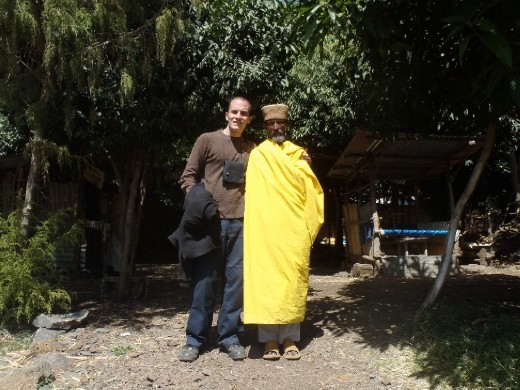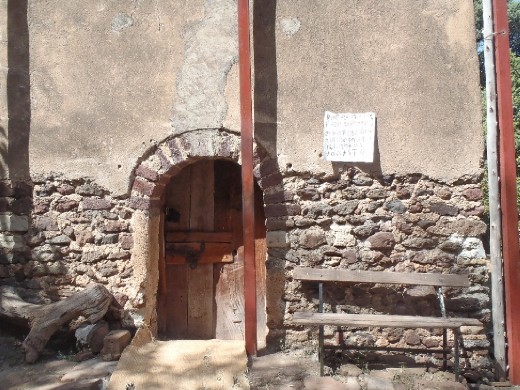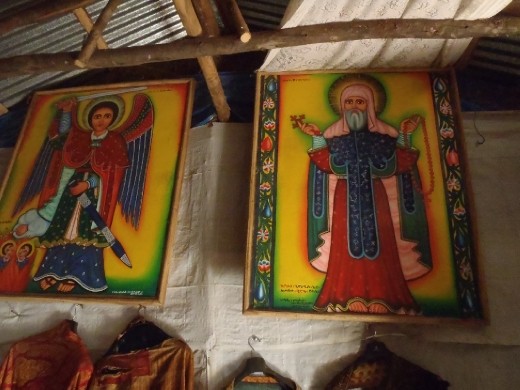Many people perceive monasteries to exist in places like Tibet, India, or Bhutan. If you've ever read about Barry the Bravest St. Bernard you may think of the St. Bernard Monastery in Switzerland. However, the islands of Lake Tana have their share of monasteries and I would visit some of them today. Let's see: I didn't sleep particularly well last night. I had worn my trousers, long-sleeve shirt, and socks to bed but the mosquitoes ate the hell out of my face. I was immediately worried (especially since the bites were that close to my brain) because I've heard malaria is endemic in Bahir Dar. I have chloroquine tablets but many African strains are resistant to chloroquine and the pills taste horrible! You wouldn't give them to your worst enemy. My best bet is to remain covered whilst in Bahir Dar. For someone who doesn't care for hotels, the Ghion Hotel comes as a pleasant surprise. French toast and tea for breakfast are both cheap and filling, birds fly around the beautiful flower-filled courtyard, and there is a spectacular sweeping vista of Lake Tana from your breakfast table. The sunrise is among the best I've ever seen! Last night I asked around about a boat trip to the monasteries and one person told me he knew of a friend but he never got back to me. As I was feasting on my french toast a local approached me and offered me a trip out to the monasteries for 150 birr. As I got my stuff together I realized I forgot my water filter, and I had already walked a good distance. Since I'd be out there for a few hours I had to buy a bottle of water. My goal for my time in Ethiopia is to not buy a single bottle of water, but this would end up being the only bottle of water I bought during my time here. A few passengers who were expected to show up didn't, so I was told I had to pay 300 birr, but I raised a stink about it (the charge is for the boat and costs less the more passengers there are). The tout who brought me here told me not to worry and that I could pay 150 birr. That helped a lot because I was unsure if admission fees to the monasteries covered all of them or each. The other passengers were a couple of Germans, and Ethiopians from Addis on vacation in Bahir Dar. We cruised briskly along beautiful Lake Tana; the colour of which blends in well with the sky. A half hour later we disembarked at the Monastery of Kebran Gabriel where a priest in a yellow robe greeted us.

There's a gift shop selling artwork and handicrafts but visiting the monastery is restricted to men and costs 100 birr. It's a pretty steep walk up as well. At the top of the hill is the monastery!

A priest greeted me and after taking off my shoes I was shown a centuries-old Bible and various paintings and relics older than anything in the Western Hemisphere.

All Ethiopia religious paintings have huge eyes; you'll notice that if you see enough of the. Some of the priests at the monasteries live their entire lives at the monastery and never leave the island (though many of them speak some English due to dealing with foreigners). After snapping some final photos we cruised across the water on over to Debre Maryam. Since I was running low on money I didn't visit the monastery but I've learned that if you've seen one, you've pretty much seen them all. Ethiopia's history is very fascinating but if you don't know much about religion or Christianity it can be confusing. We then cruised over to potentially spot some hippoes but there were none to be seen. As we docked at our next stop we had to step on to a makeshift dock that's partly submerged.

It was another monastery, but whilst the others entered I sat for a coffee and a whiff of incense. Fried fish at 25 birr seemed hard to beat as well as tasty, but as we boarded the boat back to Bahir Dar I bit into more bone than fish so just about all of it went to the pelicans and hippoes. Today we visited three monasteries but there are at least a dozen on and around Lake Tana. The lake is vast: there's a ferry to Gorgora that takes the better part of a day and a half to cross. It was blistering hot when we got back to Bahir Dar and I was wearing a long-sleeve shirt. It felt uncomfortable but I'd rather take that than being bit up by mozzies. Back at the Ghion Hotel I chilled for awhile and talked with another traveller named Tyler. He recently finished his service in the Peace Corps in Namibia and is now travelling around in Africa. His T-shirt shows an upside-down hand with an outstretched thumb in the shape of Namibia (the outstretched thumb is the Caprivi Strip). We're both pitching tents tonight so he's my fellow camper. I must admit I really like Bahir Dar and I decided tonight I'd be staying tomorrow night as well. Tonight I was up for some traditional habesha (Ethiopian) fare. When I glanced at the menu another traveller referred me to a new place called Wudae Coffee up the road, and that's where I headed. One thing Ethiopians can get better at is spelling. As I walk out the entrance of the Ghion there's a sign advertising products for sale at the gift shop; some people wouldn't know what a "neakless" is. When I ordered lamb tibs the server poured them atop my injera and I feasted away. I was hungry tonight, and these tibs tasted great alongside a traditional coffee. I didn't pay more than US$3 for my meal, which included tibs and coffee, and a cup of tea at the end. Tonight I set up my tent, which would be my mosquito net. And then I just took it easy, downing tej and chatting to some fellow travellers. Bahir Dar is lovely with its lakeside setting, and the monasteries are only a short boat ride away. Monasteries and lakes filled my day contently! What more could I ask for?